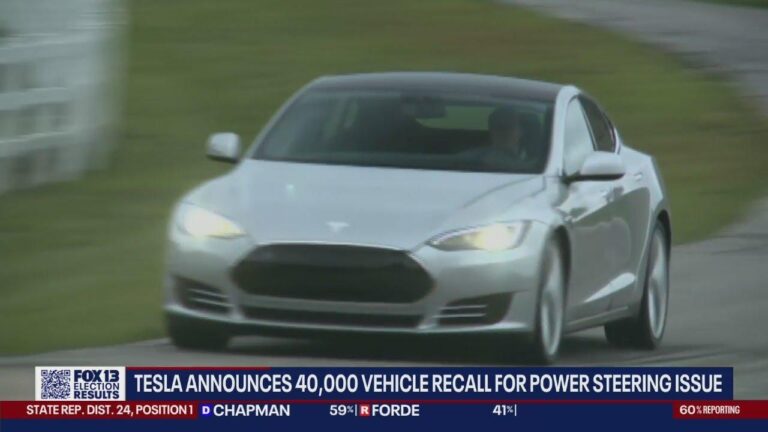Tesla has announced a recall of approximately 376,000 vehicles in the United States due to potential power steering issues, Reuters reports. The recall, which affects multiple models, has raised concerns over vehicle safety and reliability. In the wake of the announcement, Tesla’s shares experienced a notable decline in trading. This development adds to the scrutiny the automaker faces as it continues to expand its market presence amid increasing regulatory pressure.
Tesla Issues Large Scale Recall Over Power Steering Defect in US
Tesla Inc. has announced a major recall affecting approximately 376,000 vehicles in the United States due to a critical power steering defect. This safety concern involves models produced between 2021 and 2023, where the power steering system may fail unexpectedly, increasing the risk of accidents. The National Highway Traffic Safety Administration (NHTSA) highlighted that the issue could lead to reduced vehicle maneuverability, especially at low speeds, prompting the immediate and large-scale recall.
The recall has spurred an immediate negative reaction in Tesla’s stock market performance, with shares dropping following the announcement. The automaker is urging affected owners to schedule repairs, which will be conducted free of charge. Key details about the recall can be summarized below:
- Number of vehicles recalled: ~376,000 in the US
- Affected models: Model 3, Model Y (2021-2023)
- Issue: Potential power steering failure
- Impact: Increased risk of loss of control
- Remedy: Free software update and hardware inspection
| Model | Production Year | Estimated Units |
|---|---|---|
| Model 3 | 2021-2023 | 220,000 |
| Model Y | 2021-2023 | 156,000 |
Impact on Tesla Shares Following Safety Concerns and Market Reaction
The recent recall of 376,000 Tesla vehicles across the United States due to potential power steering malfunctions has triggered immediate repercussions in the stock market. Investor confidence took a noticeable hit as shares experienced a sharp decline. The news surfaced just as Tesla shares had been showing promising growth, thus amplifying concerns around the company’s safety protocols and long-term reliability. Market analysts point out that such recalls often raise red flags for shareholders, particularly when safety is involved, leading to swift sell-offs.
Key factors influencing the drop include:
- Heightened scrutiny from regulatory bodies and potential fines
- Concerns over increased operational costs to address the recall
- Possible impact on Tesla’s brand reputation and future vehicle sales
- Investor wariness surrounding Tesla’s quality control standards
| Date | Share Price Before Recall | Share Price After Recall | Percentage Change |
|---|---|---|---|
| April 20, 2024 | $190.45 | $177.30 | -6.93% |
Technical Analysis of Power Steering Malfunction and Potential Risks
The core of the power steering malfunction lies in the electric power steering (EPS) system’s control module, which reportedly suffers from potential software faults causing intermittent loss of assist. This disrupts the ease with which drivers can maneuver their vehicles, especially at lower speeds, increasing the steering effort required. Tesla’s engineering teams have identified that these failures emerge from a combination of faulty sensor inputs and module communication errors, which could result in the system defaulting to manual steering mode without warning.
Potential risks associated with this malfunction include:
- Reduced vehicle control during critical maneuvers or emergency situations
- Increased driver fatigue due to heavier steering inputs
- Elevated risk of collisions, particularly in urban driving environments where frequent turning is necessary
| Parameter | Potential Impact | Frequency |
|---|---|---|
| EPS Control Module Fault | Loss of steering assist | Intermittent |
| Sensor Input Error | Incorrect steering feedback | Rare |
| Software Communication Glitches | System resets to manual mode | Occasional |
Consumer Advice and Steps for Tesla Owners Amid Recall Process
Owners affected by this recall should immediately check their vehicle identification number (VIN) on Tesla’s official website or contact customer service to confirm if their model is included in the recall batch. It is crucial to refrain from attempting any repairs independently, as the power steering issue could lead to sudden steering loss, creating a safety hazard on the road. Tesla has committed to providing free repairs at authorized service centers, emphasizing the importance of scheduling a service appointment promptly to avoid prolonged risks.
To streamline the recall process and minimize inconvenience, Tesla owners can follow these key steps:
- Verify VIN: Confirm recall status using Tesla’s online tool or hotline.
- Schedule Inspection: Book a service appointment via the Tesla app or website.
- Maintain Records: Keep all repair and communication documents for future reference.
- Observe Driving Behavior: Monitor for unusual steering feedback and report any irregularities immediately.
| Step | Action | Expected Outcome |
|---|---|---|
| 1 | Check VIN Recall Status | Identify if vehicle is affected |
| 2 | Schedule Service Appointment | Secure repair slot with Tesla |
| 3 | Undergo Power Steering Inspection | Ensure vehicle safety |
| 4 | Complete Necessary Repairs | Restore optimal steering function |
Concluding Remarks
The Tesla recall of 376,000 vehicles highlights the ongoing challenges automakers face in ensuring the safety and reliability of increasingly complex electric and autonomous vehicle systems. As the company works to address the power steering issue, investors remain cautious, reflected in the dip in Tesla’s shares. Regulators and consumers alike will be closely monitoring Tesla’s response to this latest setback as the electric vehicle market continues to evolve.




